GREECE
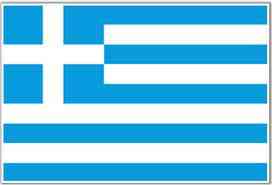
Greece’s official name is Elliniki Dhimokratia. This translates to the Hellenic Republic.
Greece cannot be described on a single webpage, a single website, or a single library. It is vast and rich. It also has a rich mythology which is intertwined with its history. It is often difficult to determine if an event is myth, fact, or a combination (eg Homer’s Iliad). We are going to try to avoid Greek mythology as best as we can while still discussing the history of Greece. The following is just the most superficial glimpse in to this well of human history.
Greece is the cradle of Western civilization. Ancient Greece is the birthplace of Western philosophy, literature, and drama – both comedy and tragedy. It produced democracy, political science, historiography, and the Olympic Games as well as many major scientific and mathematical principles. These accomplishments emerged over a very long period of time.
Archeological evidence suggests that there were Paleolithic civilizations in Northern Greece as early as 200,000 BC. There is also evidence of Neolithic farmers as early as 7,000 BC.
During the Bronze Age, three separate civilizations came and went. The Cycladic civilization flourished in the 3rd millennium BC. Subsequently the Minoans, an advanced and peaceful culture based on Crete, spread their influence throughout the Aegean starting around 1750 BC. Then the Mycenaeans spread their influence to Crete around 1450 BC as the Minoan civilization declined. The Mycenaean civilization was probably destroyed with the eruption of Thira – one of the largest volcanic eruptions on the planet.
This was a relatively short period but possibly the high point in Greek civilization. In this short period, the Greeks displayed remarkable creativity in thinking, writing, theater, and art. This period produced the thinkers Socrates, Plato, and Aristotle. This period also produced the tragedians Sophocles and Euripides. Unfortunately this rapid development also produced warfare, and the Peloponnesian War between Athens and Sparta was fought from 431 to 404 BC. However, both sides were ultimately defeated by Philip II of Macedon in 338 BC.
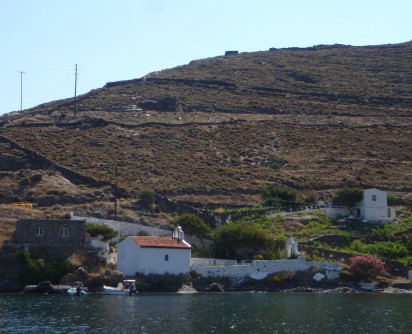
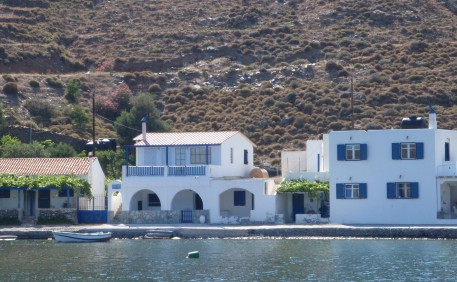
Greek nationalism was emerging in the early 19th century, and anti-Turk uprisings began. Greece’s War of Independence had begun. In a brutal response, in 1822, Ottoman forces massacred 30,000 Greeks on Chios and enslaved 60,000. This tragedy brought the plight of Greece to the world’s attention, and Greece gained its independence in 1832.
In the second half of the century, Greece reasserted its sovereignty over many islands. Greece nearly doubled its territory in the 19th century.
In the early part of the 20th century, Greece again doubled their territory during the Balkan Wars of 1912-1913. They joined the allies in World War I, and they unsuccessfully tried to take Constantinople by force after the war. Million of Greeks were expelled from Smyrna in 1922, then most of the remaining Greek population was expelled in 1923 with the ‘population exchange’ mandated by the Treaty of Sevres.
Greece tried to remain neutral at the onset of World War II, but they were invaded by Italians, and later Germans, and Greece sided with the allies. After the war, they experienced a civil war between the Greek government and the communists from 1946 until 1949. Greece joined NATO in 1952 around the time problems with Cypress arose. Cypress successfully seceded from Greece in 1960.
A military dictatorship assumed power in Greece from 1967 till 1974. Democracy was reestablished in 1974 and the Greek monarchy ended. A socialist government was elected in 1981. Relationships between Greece and Turkey improved after both countries were hit by severe earthquakes in 1999.
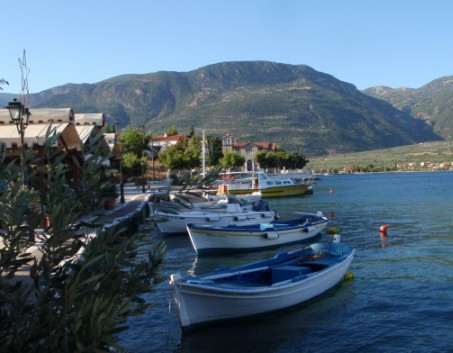
Greece joined the EU in 2000 and began using the Euro as its currency in 2002. They hosted the Olympic Games in 2004. Then they fell in to a severe economic crisis in 2009.
The future of Greece is uncertain. Massive loans have been made to prop up their failing economy, but the loans were contingent on austerity measures that are very unpopular with much of the Greek population. Greece is currently trying to form a new government that can address these issues. They held elections on May 16, 2012 that were inconclusive. No party received a majority. Further elections were held on June 17, 2012.
Although they seem to be making some progress in forming a new government, they still risk leaving the EU and possible bankruptcy. Their current situation is chaotic, and it is not yet clear where they will go from here.
It would be an understatement to say that Greece is currently in a state of transition. Although much is known about their past, much about their future is uncertain.
Greece is comprised of just less than 51,000 miles of land. This includes the mainland, the Peloponnese peninsula, and the islands. There are 1,200 to 1,600 islands – depending on the size criteria to consider a chunk of rock an island. Approximately 227 of the islands are inhabited, but only 78 have more than 100 inhabitants. With so many islands, Greece’s coastline is 8,498 miles – the 11th longest of any country.
The mainland and islands of Greece are often described in eight groups. They can be visualized as the face of a clock with mainland Greece at 12:00. Going clockwise, the island groups include the Sporades, northern Aegean, Dodacanese, Crete (at 6:00), Argo-Saronic, and Ionian islands. In the center are the Cyclades islands. We do not know the origin of these groupings.
Despite having 1,400 islands, 80% of Greece is mountainous. The tallest peak is Mt. Olympus at 9,570’.
The Greek economy has been in chaos since 2009. They have been using the Euro as its currency since 2002; however, the future of the Euro in Greece is uncertain. In fact, Greece remaining a part of the EU is also currently uncertain.
Their sovereign debt is unsustainable. They have received massive economic bailouts that were contingent on austerity measures that have proven unpopular with the Greek population. Unemployment has soared. Their economic future is uncertain.
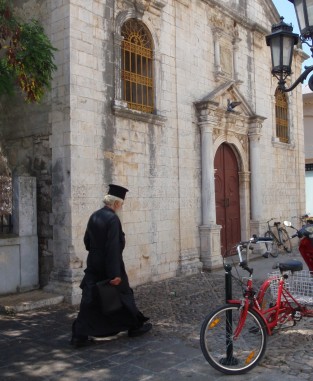
The Greek government is a multiparty republic with one house. There are currently elections being held to find a government to get Greece through its current serious economic crisis. They are seemingly without leadership at present.
We visited the mainland and all island groups other than the Sporades and Crete. We made various stops on the mainland, and we visited 14 islands. Come along as we describe our experience sailing in Greece.
Go to our sailing in Greece page or return to our Destinations page.